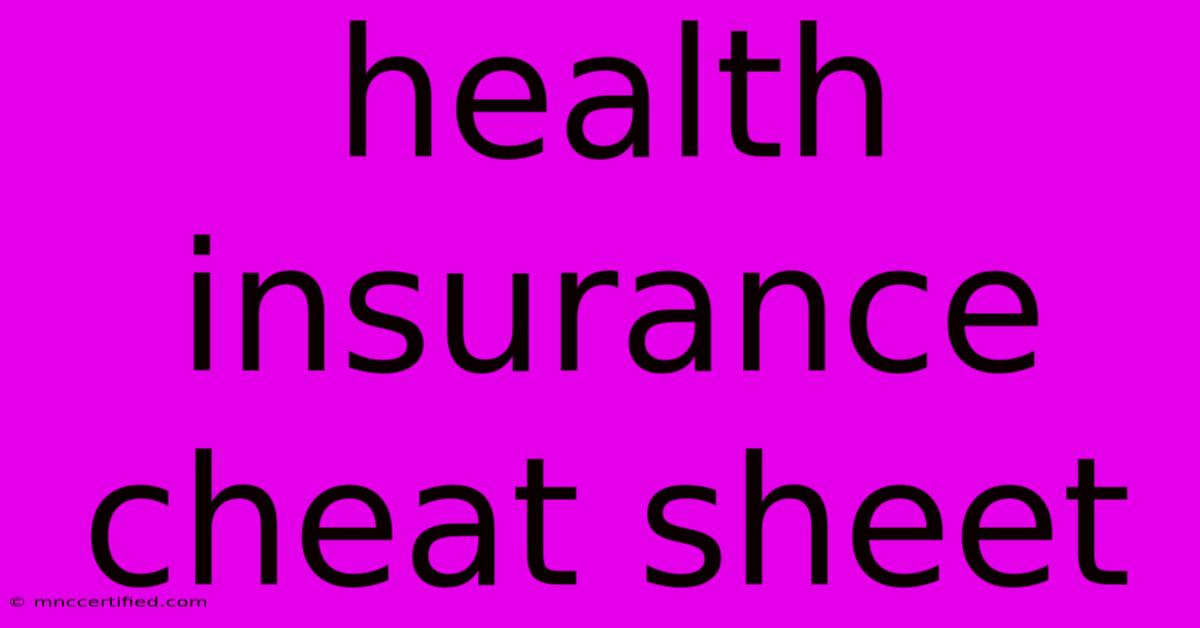Health Insurance Cheat Sheet

Table of Contents
Health Insurance Cheat Sheet: A Guide to Understanding Your Coverage
Navigating the world of health insurance can feel like deciphering a foreign language. This health insurance cheat sheet breaks down the essential terms and concepts, empowering you to understand your coverage and make informed decisions. Whether you're choosing a plan, filing a claim, or simply trying to understand your benefits, this guide is your go-to resource.
Key Terms You Need to Know
Understanding these fundamental terms is crucial for effectively navigating your health insurance plan:
-
Premium: The monthly payment you make to maintain your health insurance coverage. Think of it as your subscription fee. Higher premiums often mean lower out-of-pocket costs later on.
-
Deductible: The amount you pay out-of-pocket for covered healthcare services before your insurance company starts paying. For example, a $1,000 deductible means you pay the first $1,000 of your medical bills.
-
Copay: A fixed amount you pay for a covered healthcare service, such as a doctor's visit. This is usually a smaller amount than a co-insurance payment.
-
Coinsurance: Your share of the costs of a covered healthcare service, calculated as a percentage (e.g., 20%). This applies after you've met your deductible.
-
Out-of-Pocket Maximum: The most you'll pay out-of-pocket in a year for covered services. Once you reach this limit, your insurance company pays 100% of the costs for covered services.
-
Network: The group of doctors, hospitals, and other healthcare providers your insurance plan contracts with. Using in-network providers generally results in lower costs.
-
Explanation of Benefits (EOB): A statement from your insurance company detailing the services provided, the amount billed, the amount paid by the insurance company, and your responsibility. Carefully review your EOBs to ensure accuracy.
-
Pre-authorization: Some procedures or treatments require pre-authorization from your insurance company before they'll cover the costs. Always check with your provider.
Understanding Different Types of Health Insurance Plans
Several types of health insurance plans exist, each with its own structure and cost-sharing features:
-
Health Maintenance Organization (HMO): Generally lower premiums, but you must choose a primary care physician (PCP) within the network who will refer you to specialists. Seeing out-of-network providers is usually very expensive.
-
Preferred Provider Organization (PPO): More flexibility to see out-of-network providers, but typically higher premiums and higher out-of-pocket costs.
-
Point of Service (POS): A hybrid plan combining aspects of HMOs and PPOs. You typically need a PCP referral for specialists, but you have some flexibility to see out-of-network providers.
-
High Deductible Health Plan (HDHP): Lower premiums but a high deductible. Often paired with a Health Savings Account (HSA) to help cover deductible expenses.
Tips for Using Your Health Insurance Effectively
-
Understand your plan's details: Don't just skim the paperwork; read your plan's summary of benefits and coverage carefully.
-
Use in-network providers: This will significantly reduce your out-of-pocket costs.
-
Get pre-authorization when necessary: Avoid unexpected bills by confirming pre-authorization requirements for procedures or treatments.
-
Review your EOBs: Check for errors and ensure that your insurance company is paying its share correctly.
-
Ask questions: Don't hesitate to contact your insurance company or your provider if you have any questions.
-
Consider a Health Savings Account (HSA): If you have a high-deductible health plan, an HSA can be a valuable tool for saving for healthcare expenses tax-free.
Beyond the Basics: Further Resources
This health insurance cheat sheet provides a foundational understanding. For more in-depth information, consider exploring resources from the Centers for Medicare & Medicaid Services (CMS), your state insurance commissioner's office, and the healthcare.gov website.
By understanding the key terms, plan types, and strategies outlined in this cheat sheet, you'll be better equipped to navigate the complexities of health insurance and make informed choices about your healthcare. Remember, proactive engagement with your plan is key to maximizing your benefits and minimizing unexpected costs.

Thank you for visiting our website wich cover about Health Insurance Cheat Sheet. We hope the information provided has been useful to you. Feel free to contact us if you have any questions or need further assistance. See you next time and dont miss to bookmark.
Featured Posts
-
Fiesta Insurance Richmond Ca
Dec 01, 2024
-
West Ham Vs Arsenal Tv Channel Info
Dec 01, 2024
-
Tui 737 Flight Abort Mid Air Blunder
Dec 01, 2024
-
Janey Godleys Rise To Fame
Dec 01, 2024
-
How Much Is Bonding A Tooth
Dec 01, 2024